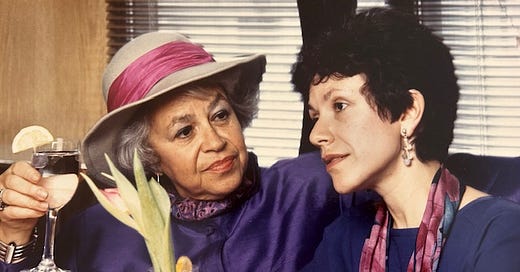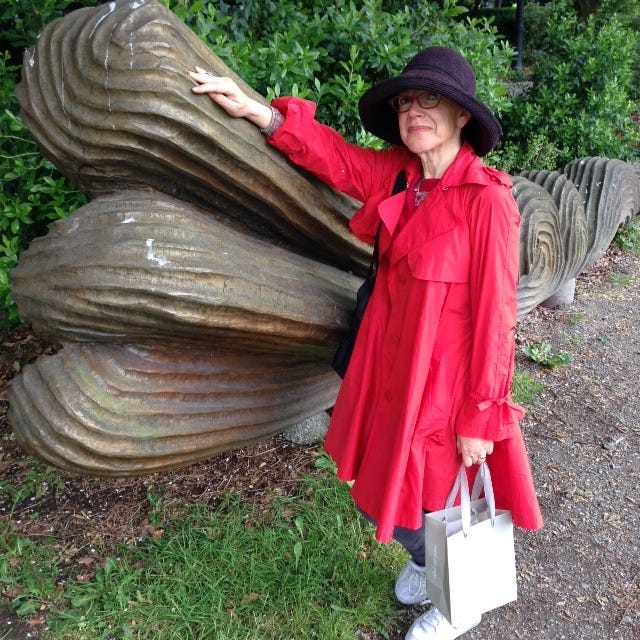Queen of Hats
My mother wore the hats in the family. She liked them big and bold. Now that she's gone, I wear hats in her memory.
After my mother died on the brink of my fortieth birthday, I bought a hat for the memorial service. It was one she might have chosen for herself—black, with a generous brim and a grosgrain ribbon at the crown—but it made me feel like an imposter. The mirror showed me a younger version of my mother, with full lips bracketed by folds that promised to deepen over time.
Hats had been my mother’s signature, from the jaunty fedora to a sombrero bedecked with trailing ribbons. In the Mexican village where she haggled for the sombrero, such hats were worn only by men, once a year, for a festival in which every male old enough to hold his liquor tore through the town on horseback, multicolored ribbons flying. My mother might have been the only woman to snag the outsize hat of manhood and flaunt it among literary folk at a wine and cheese party where I, a junior editor dressed for success in a beige linen blazer, pretended not to know her.
A woman who rocks a hat is announcing herself to the world: Here I am and proud to be. Before my mother died, and for some time after, I was not proud to claim my space. I made myself a little smaller than life, especially when she was around, big-boned and bedecked with Mexican silver. My mother quoted Milton and Marvell like the distinguished professor she’d have been if not for her gender, and spun a yarn like the writer she became, embellishing freely for dramatic effect. Every spring she picked the rhubarb that grew wild in our back yard and brought me a pie still warm from her oven, rosy juices bubbling through a golden crust flecked with sugar. She exulted in my progress as a journalist but never let me forget who really knew the ways of language. Only my mother would have called me to say, “I just read your latest piece. There’s a grammatical mistake in the first paragraph.”
Thirty-five years ago this month, I took the streetcar across town with a Mother’s Day letter in my purse. My mother had not been herself. She didn’t come to pick rhubarb, and she’d begun mixing up her words. She came to the door with the bewildered look of a traveler ferried to an address demolished years ago. “I was going to make macaroni and cheese,” she said, “but I can’t remember how.” I read her the letter, doubting she could read it herself.
Dear Mother,
When I was little, I watched you lace a stew with mushrooms and wine. You taught me that a meal should nourish the spirit as well as the body.
When I still saw my future as a haze of ballet tutus, wedding veils and long-stemmed roses, I watched your world expand as you began to teach and write. You taught me that it’s never too late for a woman to strive for mutuality and respect in love.
This Mother’s Day weekend, you are teaching me still—about dignity in the face of adversity, about faith in the sustaining powers of friendship, about the courage to fight for what makes life worth living.
All my love,
Rona
Alzheimer’s ran in my mother’s family. She feared it was erasing her, one memory at a time. By her lights, she was lucky. A brain tumor took her within five months. While the steroids worked, she held court in her garden, presenting to a stream of guests all the treasured hats and jewelry she had worn as the commanding hostess of old, who kept the Negronis flowing before they appeared in every bar. Necklaces and earrings went quickly. Hats, not so much. “I don’t look good in hats,” women said. Whoever took the sombrero might have hung it on a wall, unable to contemplate such whimsy on her own head.
My first few motherless Mays, I burned with envy at women who had mothers to receive red roses and invitations to brunch. I had never observed those rituals; my mother didn’t seem to miss them. What was Mother’s Day but a marketing blitz? Yet I needed my mother to bake me a rhubarb pie and offer advice when an editor killed my story. At 40, I had reached middle age but I still wanted to be small for someone, and only my mother would do.
From near and far, I’ve observed countless women on their passage to the land of the motherless. I’ve consoled friends, conducted interviews, followed wrenching conversations on Facebook. While editing a women’s magazine, I answered hundreds of responses to my Mother’s Day column for the motherless, by far the most popular I wrote. Some readers carried that piece in their wallets until it fell apart. The death of almost any woman’s mother—nurturer and champion, crusher of the spirit or somewhere in between—can be a life transformation on a par with becoming a mother. It steals, it levels, it smashes. And at the same time it opens the way to a larger life unfettered by maternal expectation or example.
Losing my mother forced me to get bigger. Her death at 67 lit the hidden spark of my ambition. I won a top job because I dared to pursue it. I no longer had to ask whose dream this was, mine or my mother’s. My first hat prepared me for the quest. When I made the purchase, all I saw was how well it framed my face. I didn’t consciously strive to take up space, but as time passed I came to like the authority it conferred. Here I am, world, and proud to be.
My mother was 20 years gone when it struck me that I no longer heard her voice inside my head. Every thought that came to me was well and truly mine, not part of the running maternal commentary that had played all my life, unnoticed until it finally shut up. Now my mother only speaks when I beam a perception or a story her way and listen for the answer. Yet a little of her goes with me every time I wear a hat—and I never leave home without one, except after dark in mild weather. I’d rather have Fredelle Maynard on top of my head than making pronouncements from within it.
She wouldn’t approve of my favorite hat, a memento of free-spending days in the magazine business. I can hear her now: “Oh, Rona, how could you?” For what it cost—more than 300 bucks, before the Twin Towers fell—I could have purchased a multitude of capons from the best poultry vendor in town. (My frugal mother would be glad to tell you how many capons; she relished corrective arithmetic.) I’ve picked up fetching hats for as little as 20 bucks, but there’s only one hat I can wear all year and in the rain.
Once black, my Hat of Hats is now either aubergine or dark brown, depending on the angle of the light. Some would say it’s over the hill. I’d say that, like me, it is burnished by experience. I have sat on this hat, rolled it up and nearly lost it, but nothing in my closet works comparable magic.
With the hat pulled low on my brow, softening my face and concealing quite a few lines, I could pass for a decade younger, barely qualifying for a senior discount. Yet I’m seven years older than Fredelle ever got to be. The dark eyes gazing at me could be hers.
Good morning, Mother. It’s still true, what I wrote for you 35 Mother’s Days ago. I’ll always miss you but I like my bigger life. You understand, don’t you? After all, you too bloomed without your mother.
For the story of what my mother did for love, head over here to one of my most popular posts. You’ll find that Mother’s Day editorial here.
And now some news that’s been a while in coming. Fifteen of you have told me you’d be glad to pay for Amazement Seeker—and you’ve stepped up by pledging your support. Your belief in me is a tonic. Words have made me a good living at the helm of a magazine (and an okay living as a writer for others), but there’s no intimacy to a check from accounts payable. One reader’s five dollars a month is like a cup of coffee from a friend.
If you don’t pay, you’re not belittling me or putting my welfare in jeopardy. You won’t miss out on any of my posts. I write for the joy of telling stories to everyone who gathers here. It’s an honor and a privilege, especially when you’re moved to comment.
And speaking of comments, now’s the time. Nothing like mothers and daughters to stir the conversational pot. Are you thinking of your mother today? Tell us about her.







Very interesting. I don't identify at all. Like you, I had a very strong mother, but unlike yours, mine was utterly involved in her career (yes, it wasn't the done thing, but she was determined to show that she could do it, even with three children) and she was very successful but only tangentially interested in her children. She handed out discipline and asked the right questions but had only a lukewarm interest in the answers. In many ways, she was the traditional pater familias and my father was much more involved in raising us, teaching us, showing us the world as well as love etc etc. Of course, I thought it was the normal way of things, even against all the obvious evidence.
From all the little comments I heard, I think she looked down on me and would occasionally make barbed comments. Certainly never gave me that ferocious maternal love other women seem to get. I have never been in therapy (never felt I needed it, rightly or wrongly), but over the years I think I just disconnected myself. And I moved to England in my late 20s, so she was never much part of my life after that and our relations were perfunctory and performative. When she got dementia in her mid-80s, my reaction was that she was 'de-clawed' – and that was very relaxing. She died 20 years ago and I think about her hardly ever.
Somehow, reading this over, it makes me sound like a terrible daughter but I don't feel guilty at all. I think I instinctively did what I needed to do to be me. Interestingly, almost everyone at her funeral were work colleagues who extolled her brilliance and insight.
I didn't expect to write so much, but it all flooded out so perhaps it was therapeutic.
Thanks.
Rona, this beautifully captures what can be complicated for many of us- feeling small, the voice in our head (and now on top of yours!), the loss when we lose them and some of the bloom that follows for many. Thanks for writing and sharing.